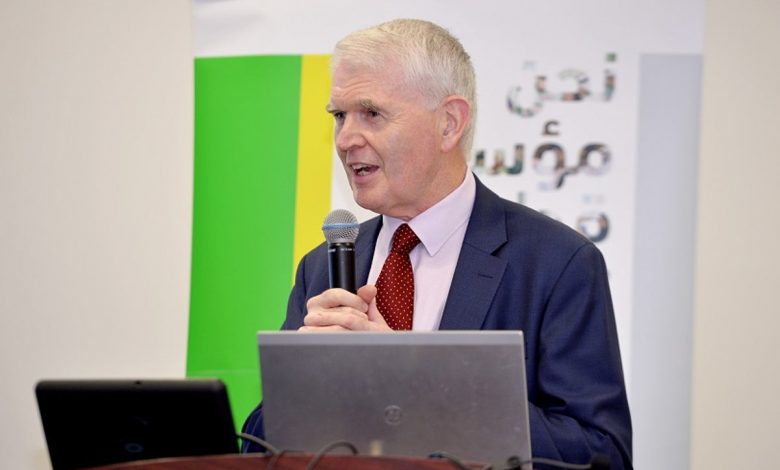
Dr. Richard O’Kennedy: Haste to produce coronavirus vaccine will have serious consequences
د. ريتشارد أوكيندي: عواقب التسرّع في إنتاج لقاح فيروس كورونا وخيمة
The Peninsula
The rapid pace at which coronavirus continues to spread across the world has inevitably raised questions about testing, vaccines, and potential treatments — including why testing for the virus appears difficult and time-consuming, how long a vaccine will take to develop, and how it will work once it has been developed.
Dr. Richard O’Kennedy, Qatar Foundation Vice-President for Research, Development, and Innovation, and an immunology expert, said, “It’s important to remember that what is being tested for is a specific kind of novel virus.
“Not only does it take time to develop a virus test of any kind, but it is also vital to ensure that any test detects only this particular strain of coronavirus, and no other.”
Adding to the complexity of developing accurate testing kits is the urgency with which the world is seeking these tests. However, as Dr. O’Kennedy points out, the companies developing them need to ensure they are validated and approved before they can move to the mass manufacturing stage, with the process rendered even more difficult due to the speed with which COVID-19 cases worldwide have risen.
“We can expect enough tests to ultimately be developed, but getting to this point will take some time, given the gravity of the current situation,” he added.
A vaccine for coronavirus has been the subject of discussion since the start of the outbreak, with such conversations often failing to recognize that the vaccine development process can take as long as 10-15 years. However, given the severity and ever-changing consequences of the current global pandemic, specialists in several countries are working around the clock on research that is aimed at developing a vaccine within a much shorter timescale.
As Dr. O’Kennedy explains, the immune system is essentially a series of defense mechanisms within the human body. People can play their own part in ensuring something that may look to attack their body does not have the opportunity to do so, which explains why healthcare professionals unanimously agree that the best course of action is to keep washing hands and observe social distancing guidelines.
When an infection does get through these precautions, the immune system creates antibodies to fight and counteract it. However, every so often, a virus such as the coronavirus mutates and evades the human immune system.
“This process of viruses mutating and attacking people’s immune systems has been going on for thousands of years,” said Dr O’Kennedy.
“When a virus such as this enters the body, and the immune system fails to recognize it, this allows it to divide rapidly. A person will usually build up immunity, but only after a period of time. This is why scientists across the world are looking to accelerate the process of developing a vaccine.”
A vaccine can be described as something that activates or primes the immune system. The way the polio vaccine – the success rate of which has contributed to the near-elimination of polio worldwide – works, for instance, is that the human immune system is exposed to a small, inactive dose of the virus to activate an immune response. This immune response allows the body to defend itself against the virus.
“What scientists are now trying to do now is determine what can be obtained from this strain of the coronavirus that can be injected into the individual, which will allow the person’s immune system to counteract the virus,” Dr. O’Kennedy said.
The consequences of prematurely introducing a vaccine that turns out to be unsafe are potentially severe. In order to prevent this, vaccines go through rigorous testing and clinical trials, contributing to the timescales involved in introducing them.
In the meantime, the global medical community is exploring potential treatments using combinations of existing drugs. One that has gained a high profile is chloroquine, an antimalarial drug, but its effectiveness is subject to trial results.
“The World Health Organization is also looking at combinations of drugs that have been used to fight HIV, as well as drugs used to modulate immune responses, and those used for other diseases,” said Dr. O’Kennedy.
“However, we really need systematic checks to determine the most effective combinations, and this is the reason for what people may see as a delay in introducing them as treatments for this virus.”
source: thepeninsulaqatar
الدوحة – العرب
قال الدكتور ريتشارد أوكيندي، نائب رئيس البحوث والتطوير والابتكار في مؤسسة قطر، إن الوتيرة السريعة التي يستمر بها تفشي فيروس كورونا «كوفيد – 19» في جميع أنحاء العالم، تثير تساؤلات حول الاختبارات، واللقاحات، والعلاجات المحتملة، بما في ذلك الصعوبة والوقت المستغرق في اختبار الفيروس، والمدة الزمنية اللازمة لتطوير اللقاح، وكيفية استخدامه بمجرد أن يتم تطويره. وأكد أهمية تذكّر أن ما يجري اختباره هو على نوع محدد من الفيروسات الجديدة، وأن الأمر يستغرق وقتاً لتطوير اختبار لفيروس من أي نوع، لافتاً إلى ضرورة التأكد من أن الاختبار يكتشف هذه السلالة المحددة من الفيروسات وليس غيرها.
شدّد على أن الحاجة الملحة التي يسعى إليها العالم تزيد من تعقيد تطوير مجموعات اختبار دقيقة، لافتاً إلى أن الشركات التي تطور الاختبارات تحتاج إلى التأكد من صحتها، والتحقق منها قبل أن تنتقل إلى مرحلة التصنيع الكامل، إضافة إلى ذلك، ما يجعل العملية أكثر صعوبة هو سرعة وارتفاع عدد حالات الإصابة بفيروس «كوفيد – 19» في جميع أنحاء العالم.
وأضاف: «يمكننا توقع إجراء اختبارات كافية في نهاية المطاف، لكن الوصول إلى هذه النقطة سوف يستغرق بعض الوقت، بالنظر إلى خطورة الوضع الحالي».
وأضاف أن ما يحاول العلماء القيام به حالياً هو تحديد ما يمكننا الحصول عليه من السلالة الموجودة بفيروس كورونا «كوفيد – 19»، لحقنه في الجسم بحيث يتمكّن جهاز المناعة من مقاومته، منوهاً بأن عواقب إنتاج لقاح قبل الأوان واكتشاف أنه غير آمن قد تكون وخيمة.
وأوضح أن اللقاحات تمر باختبارات صارمة وتجارب سريرية عديدة، وهو ما يساهم في إطالة الإطار الزمني المطلوب لإنتاجها.
وقال: «يُعدّ موضوع إيجاد لقاح مضاد لكورونا «كوفيد – 19» محلّ نقاش منذ بداية تفشيه، وبالرغم من إخفاق هذه النقاشات غالباً في إدراك أن عملية تطوير اللقاح يمكن أن تستغرق ما بين 10 إلى 15 عاماً، ونظراً لخطورة الأوبئة العالمية المتغيرة باستمرار، يعمل المتخصصون في العديد من البلدان على مدار الساعة على بحوث تهدف إلى تطوير لقاح خلال فترة زمنية أقصر بكثير».
وأوضح أن تحوّر الفيروسات ومهاجمتها للجهاز المناعي هي عملية مستمرة منذ آلاف السنين، فعندما يتمكّن فيروس كهذا من دخول الجسم، ويفشل جهاز المناعة في التعرّف عليه، يتيح له ذلك الانقسام والانتشار بصورة سريعة، لافتاً إلى أنه عادة ما تتكوّن مناعة في الجسم ضده، ولكن بعد مرور فترة من الوقت، وذلك هو السبب وراء محاولات العلماء في جميع أنحاء العالم للتسريع في عملية تطوير لقاح.
المصدر: alarab



